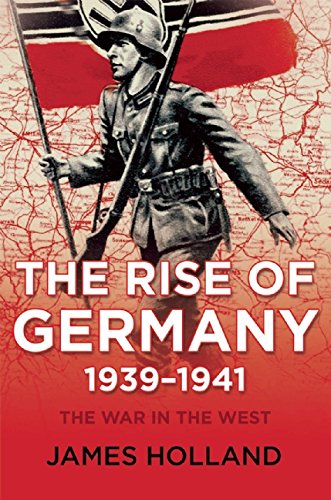
The Rise of Germany, 1939–1941
The War in the West
کتاب های مرتبط
- اطلاعات
- نقد و بررسی
- دیدگاه کاربران
نقد و بررسی

August 24, 2015
In this first of a three-volume history of WWII in Western Europe and the Mediterranean, British historian Holland (The Dam Busters) discusses the major battles, events, and factors important to the first two years of conflict in Western Europe. Relying on archival research, extensive secondary sources, and personal memoirs, Holland nimbly weaves the complex military, diplomatic, political, economic, and social patterns that marked the conflict on a global scale. He organizes the book by the major military events of the early war period: the road to war, the fall of France, the Battle of Britain, and the war at sea and operations around the Mediterranean. Impressively for so weighty a subject, Holland keeps the reader engaged by showing the major events through the eyes of the participants—at the strategic level with politicians and generals, and at the tactical level with common soldiers and civilians. Though it would have been easy to fill the book with descriptions of combat, Holland balances those with such critical topics as political relations, economics, and the role of technology. Holland has produced a worthy history that both general readers and WWII enthusiasts can enjoy.

September 15, 2015
Holland's (Dam Busters; The Battle of Britain) goal in this first volume of a projected trilogy is to incorporate a generation of academic research about World War II and make it accessible for a general audience. The author adopts the revisionist argument that Germany's war effort was hindered by a variety of strategic weaknesses, especially in raw materials, while the Allies had greater access to natural resources and populations. Allied defeat cannot be understood merely as the result of a mechanized Wehrmacht blitzing across Europe until stopped at the gates of Moscow; defeat was the result of strategic and operational mistakes, and for France, the lack of political will. While Holland is almost certainly correct that the old interpretation of the war is still commonly accepted in popular culture, a quick survey of recent literature on the war reveals that a number of popular authors have also challenged the old paradigm. VERDICT Holland skillfully integrates the broad political, diplomatic, economic, and military narrative with stories of individuals, civilians, and soldiers from all the belligerents. While his approach may not be as unique as he claims, Holland's volume is a worthy addition to libraries. [See Prepub Alert, 4/20/15.]--Frederic Krome, Univ. of Cincinnati Clermont Coll.
Copyright 2015 Library Journal, LLC Used with permission.

























دیدگاه کاربران